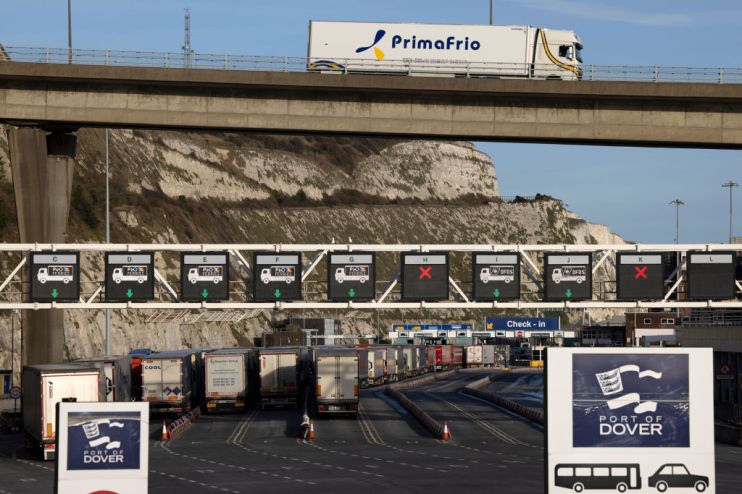Brexit: UK postpones new checks on EU goods for six months

The UK has today moved to postpone implementing post-Brexit checks on food coming from the EU for another six months.
Boris Johnson’s UK-EU relations chief Lord David Frost said the decision was made to give traders time to focus on reopening as the Covid restrictions are eased instead of spending time on the extensive new paperwork required.
Physical checks on food and agricultural products coming into the UK from the bloc will now start in January instead of in July.
Health certificates will now be needed for these goods in October instead of next month.
The EU imposed complete border controls on goods entering the bloc from the UK on 1 January when the Brexit transition period ended, however Boris Johnson opted to have a transition period for goods coming the other way.
Before the Open newsletter: Start your day with the City View podcast and key market data
The new customs procedures caused extensive delays at EU borders and product waste for some British exporters, with the seafood and meat industries particularly affected.
The government wants to avoid a similar situation here, especially as the economy begins to open up next month.
“We will now introduce border controls broadly six months later than planned to give traders time to focus on getting back on their feet as the economy opens up after a difficult year,” Frost said.
Cabinet Office minister Michael Gove added: “Although we recognise that many in the border industry and many businesses have been investing time and energy to be ready on time, and indeed we in government were confident of being ready on time, we have listened to businesses who have made a strong case that they need more time to prepare.”
The Institute of Directors today revealed that one-in-five of its members who traded with the EU last year have stopped since the UK left the EU’s single market and customs union on 31 December.
Business groups were worried that further paperwork and red tape coming in before firms are prepared could have further dented UK-EU trade.
Chambers of Commerce director general Adam Marshall said: “This is a positive step as it recognises what everyone in business has known for weeks now – UK-EU trade has faced, and continues to face, significant disruption and difficulty.
“What businesses want to see is an end to the damaging political rhetoric from both sides, and a focus on improving border flow for the long term.”
It comes amid two separate UK-EU rows on vaccines and on Northern Ireland.
Boris Johnson and foreign secretary Dominic Raab yesterday hit out at “completely false” allegations made by the EU about the UK blocking shipments of vaccines to other nations.
EU President Charles Michel on Tuesday falsely claimed the UK had an “outright ban” on exports of vaccines produced in the UK.
Raab called the EU’s UK ambassador João Vale de Almeida to a meeting on Wednesday to “set the record straight”, with UK officials reportedly furious at the comments that come during the EU’s slow rollout of the vaccine.
Brussels and London are also rowing over the UK’s decision to unilaterally postpone new border checks in Northern ireland on food, parcels and medicines sent from Great Britain.
Brussels was outraged that the UK did not consult the EU on the decision, with officials calling it a breach of the Brexit Withdrawal Agreement.
EU nations have now agreed to launch legal action against the UK in the European Courts of Justice.
Almeida said today that tensions needed to be eased for the two sides to work together post-Brexit.
“We will have differences and the last few weeks show some of those differences,” he said.
“We need to approach these not in conflict. We need to have high levels of trust – mutual trust.
“When levels of trust go down you are less capable of finding solutions.”